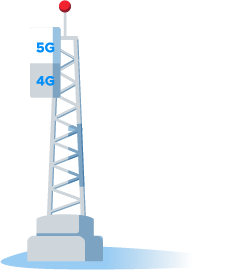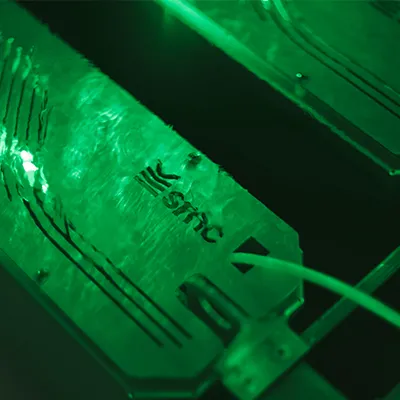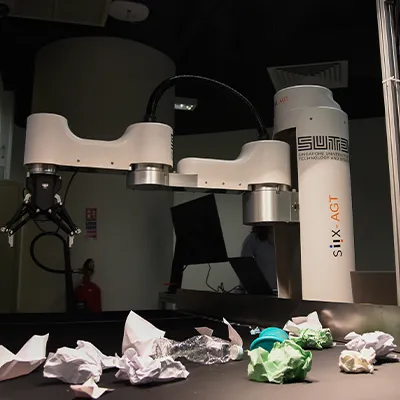
5G in Singapore
Unlock a network of opportunities
Singapore is a leading tech hub in Asia, with 80 of
the
world’s top 100 tech firms headquartered in the city-state.
The country is also
second globally in IMD’s World Digital Competitiveness
Ranking.
The country is now
bolstering its infrastructure with 5G. Take a spin through this
infographic to see Singapore's 5G roadmap, applications for
logistics, autonomous
vehicles, and healthcare sectors, and support programmes to help
you speed ahead.


Singapore's 5G Infrastructure
With a focus on reliability and enabling enterprise innovation, Singapore is setting its sights on deploying two nationwide 5G standalone networks by 2025.





A standalone 5G network will enable companies and users to tap
full-fledged benefits of 5G, and unlock greater enterprise
innovation.
Currently Singapore is supporting several operators in
deploying
both standalone and non-standalone 5G trials. These trials
provide early
opportunities for consumers to enjoy faster mobile speeds and
companies a fast start in developing use cases ahead of the
nationwide rollout.



Non-standalone
- Faster mobile network speeds
- Faster deployment, allowing short-term development of 5G use cases
Standalone
- Enables full-fledged 5G capabilities (i.e. network slicing to support different use-case requirements, higher speeds, ultra-reliable low latency communications)
- Dedicated infrastructure enhances reliability for enterprise innovation
Singapore's 5G roadmap
With trials for 5G underway, Singapore is on track to deploy a nationwide network in the coming years.



H1 2020
H2 2020
Singapore expressed its support for operators to deploy non-standalone 5G networks, with telcos M1, StarHub, Singtel leading the first wave. Singtel has also launched standalone trial network for enterprises.
End 2022
Singapore aims to deploy 5G standalone capabilities extending to at least half of the island.
2025
Two nationwide 5G standalone networks are planned, unlocking full-fledged 5G capabilities for businesses.
Future of sectors enabled by 5G
Both established enterprises and startups are already tapping into the network, testing new ideas across logistics, transport and healthcare. Click each of the icons below to find out more about 5G applications. If you're ready to explore opportunities with 5G, click on the support programmes button to learn how your company can tap into opportunities in Singapore.

Self-driving to
self-flying
Transparent and trackable
supply chains
Real-time monitoring
of patients
From self-driving to self-flying
5G will accelerate development and production of autonomous vehicles
(AV), which require
real-time edge computing, cutting edge sensing technologies and
intelligent control systems. Singapore’s Land Transport Authority
is expanding the country’s AV testbed. The entire
western part
of Singapore, more than 1,000 km of public roads, is being opened
to test self-driving vehicles.
Going beyond AVs, urban air mobility may soon become a reality
in Singapore. Telco M1
and Airbus
partnered the Singapore Government
to conduct network
coastal trials of unmanned aerial vehicles.






Transparent and trackable supply chains
5G will help to scale blockchain solutions, by enabling large amounts of data to be collected and analysed. Startups in Singapore, such as DiMuto, which enables the tracking and tracing of physical products for global supply chains, will be able to leverage 5G to deploy more innovative solutions for their customers.


Real-time monitoring of patients
The improvement to communication capacity and speed will also
benefit
the healthcare industry. The Singapore
General Hospital (SGH)
has
been testing applications that enable real-time monitoring of
patients at the hospital’s emergency department.
At the NYP-StarHub Application & Experience Centre for
5G, SGH
is
working with Nanyang
Polytechnic to co-develop applications that
will tap the benefits of 5G connectivity.



Support programmes to enable industry to capitalise on 5G
As the first of customers start to experience 5G, the next generation network is fast becoming a reality in Singapore. The Singapore government has and will continue to roll-out programmes to support industries in capturing opportunities presented by 5G.






5G Trials
$40
million has been set aside to support 5G trials in
strategic
sectors. In 2021, IMDA announced a new $30 million fund to bolster support for companies looking to test and adopt 5G solutions.
Training programmes
Efforts are underway to groom talent versed in 5G. Under an
initiative
by IMDA and mobile network operators, 1,000 roles in
5G expertise will be created by end 2020, with plans to
train 5,000 more professionals over the next three years.
5G Living Lab@Pixel
Launched in September 2020, the lab will facilitate industry efforts to develop new 5G solutions and build up technical capabilities. Businesses will be able to develop and test 5G-enabled devices and applications at the facility.
Collaboration opportunities
M1 and SGInnovate will collaborate to connect startups with corporate partners to implement 5G technology for the startups' products and solutions.
 Page
Page 

5G in Singapore
Unlock a network of opportunities
Singapore is a leading tech hub in Asia, with 80 of
the
world’s top 100 tech firms headquartered in the city-state.
The country is also
second globally in IMD’s World Digital Competitiveness
Ranking.
The country is now
bolstering its infrastructure with 5G. Take a spin through this
infographic to see Singapore's 5G roadmap, applications for
logistics, autonomous
vehicles, and healthcare sectors, and support programmes to help
you speed ahead.



Singapore's 5G Infrastructure
With a focus on reliability and enabling enterprise innovation, Singapore is setting its sights on deploying two nationwide 5G standalone networks by 2025.






A standalone 5G network will enable companies and users to tap
full-fledged benefits of 5G, and unlock greater enterprise
innovation.
Currently Singapore is supporting several operators in
deploying
both standalone and non-standalone 5G trials. These trials
provide early
opportunities for consumers to enjoy faster mobile speeds and
companies a fast start in developing use cases ahead of the
nationwide rollout.



Non-standalone
- Faster mobile network speeds
- Faster deployment, allowing short-term development of 5G use cases
Standalone
- Enables full-fledged 5G capabilities (i.e. network slicing to support different use-case requirements, higher speeds, ultra-reliable low latency communications)
- Dedicated infrastructure enhances reliability for enterprise innovation

Singapore's 5G roadmap
With trials for 5G underway, Singapore is on track to deploy a nationwide network in the coming years.



H1 2020
H2 2020
Singapore expressed its support for operators to deploy non-standalone 5G networks, with telcos M1, StarHub, Singtel leading the first wave. Singtel has also launched standalone trial network for enterprises.
End 2022
Singapore aims to deploy 5G standalone capabilities extending to at least half of the island.
2025
Two nationwide 5G standalone networks are planned, unlocking full-fledged 5G capabilities for businesses.

Future of sectors enabled by 5G
Both established enterprises and startups are already tapping into the network, testing new ideas across logistics, transport and healthcare.

Self-driving
to self-flying
Transparent and trackable
supply chains
Real-time monitoring
of patients

From self-driving to self-flying
5G will accelerate development and production of autonomous vehicles
(AV), which require
real-time edge computing, cutting edge sensing technologies and
intelligent control systems. Singapore’s Land Transport Authority
is expanding the country’s AV testbed. The entire
western part
of Singapore, more than 1,000 km of public roads, is being opened
to test self-driving vehicles.
Going beyond AVs, urban air mobility may soon become a reality
in Singapore. Telco M1
and Airbus
partnered the Singapore Government
to conduct network
coastal trials of unmanned aerial vehicles.







Transparent and trackable supply chains
5G will help to scale blockchain solutions, by enabling large amounts of data to be collected and analysed. Startups in Singapore, such as DiMuto, which enables the tracking and tracing of physical products for global supply chains, will be able to leverage 5G to deploy more innovative solutions for their customers.



Real-time monitoring of patients
The improvement to communication capacity and speed will also
benefit
the healthcare industry. The Singapore
General Hospital (SGH)
has
been testing applications that enable real-time monitoring of
patients at the hospital’s emergency department.
At the NYP-StarHub Application & Experience Centre for
5G, SGH
is
working with Nanyang
Polytechnic to co-develop applications that
will tap the benefits of 5G connectivity.




Support programmes to enable industry to capitalise on 5G
As the first of customers start to experience 5G, the next generation network is fast becoming a reality in Singapore. The Singapore government has and will continue to roll-out programmes to support industries in capturing opportunities presented by 5G.

5G Trials
$40 million has been set aside to support 5G trials in strategic sectors. In 2021, IMDA announced a new $30 million fund to bolster support for companies looking to test and adopt 5G solutions.
Training programmes
Efforts are underway to groom talent versed in 5G. Under an initiative by IMDA and mobile network operators, 1,000 roles in 5G expertise will be created by end 2020, with plans to train 5,000 more professionals over the next three years.
5G Living Lab@Pixel
Launched in September 2020, the lab will facilitate industry efforts to develop new 5G solutions and build up technical capabilities. Businesses will be able to develop and test 5G-enabled devices and applications at the facility.
Collaboration opportunities
M1 and SGInnovate will collaborate to connect startups with corporate partners to implement 5G technology for the startups' products and solutions.








